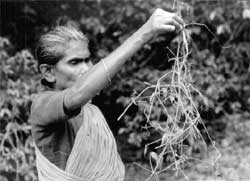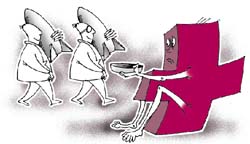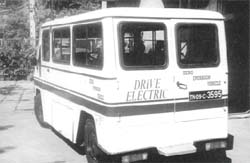
Alimentary cases
A battle royal rages in the courts of UK as two nondescript environmentalists take on a giant

A battle royal rages in the courts of UK as two nondescript environmentalists take on a giant

Swadhyay, which literally means study of the self, is a movement that has introduced realistic social change in India s rural communities

Worldwide, traditional medicinal systems are in the process of being modernised. Besides health care and conservation of medicinal plants, the rights of the local communities that have preserved these systems for centuries are also at stake

JUST 55 seconds in duration, it left 1,000 people dead. The earthquake, measuring 6.1 on the Richter scale, which devastated the hills of Uttarkashi, Tehri Garhwal and Chamoli districts in UP last October, also left 20 per cent of the houses in the region totally destroyed or severely damaged. <br>

The South"s determined efforts to scuttle the forest convention that the North was adamant on pushing through was a major triumph. A blow-by-blow account of the crucial, often tricky, negotiation
R&D is a fast evolving segment of Indian pharmaceutical industry. Innovation, international partnerships, collaborations, inflow of funds, clinical trials partnerships and co-development deals are changing the landscape of R&D. However, the potential is far greater and to aid the harnessing of this potential, the Times Group organised the ET Bio-Pharma Development Summit in Mumbai. Dr Swati Piramal, director, Nicholas Piramal, was the chairperson of the forum, with the keynote speaker being Dr Ted Bianco, director, Wellcome Trust. The highlight of the event was the special address delivered by Kapil Sibal, union minister for science and technology and earth sciences. Dr Piramal delivered the opening address to a house full of delegates. She highlighted the need of innovation in R&D and how India can excel in the same. Her address was followed by an interesting speech made by Dr Ted Bianco, director, Wellcome Trust, UK. He provided an insight into early stage R&D through translational research funding and management of intellectual property arising thereafter. Then, it was time for Mr Sibal's speech. He termed the new disease pathogens the terrorists of the 21st century and said there was an urgent need to safeguard public health. He also made a strong case for growth of R&D in case of Indian pharmaceutical industry and how it could be harnessed in India to provide affordable cure. The minister stressed on the need for a forward-looking drug policy and government subsidies to boost innovation in the country. Malvinder Singh, MD and CEO, Ranbaxy Laboratories, the speaker for the second session, gave a address on the future of generics. He informed that the global bio-generic industry was worth $60 billion today. Indian pharma industry can capitalize on this opportunity and grow to become $100 billion industry in the coming years. He pointed out that having 50 NCEs being produced by 15-20 companies is not economically sustainable. Industry needn't duplicate infrastructure as it would be feasible to unite through partnerships and collaborations, he said. He also stressed upon the need for an enabling regulatory framework, which moves away from the price control regime. He pointed out that at present, R&D done internally by the companies alone qualified for weighted deduction under section 35(2AB) of Income tax act. He urged that the government to facilitate innovation by extending this benefit to outsourced R&D as well. The third session was a panel discussion providing an HR perspective on strategies for human resource management. Dr Ganesh Shermon, partner & country head, human capital advisory services, KPMG India, Rajorshi Ganguli, director, HR, Dr Reddy's Laboratories, Sanjay Muthal, president, HR, Nicholas Piramal and Shiv Raman Dugal, chairman, Instiute of Clinical Research of India, were the distinguished speakers forming the panel. Various strategies needed to drive excellence in research and cross-functional areas were discussed. The next session emphasising on what's next in Indian bio-pharmaceuticals was moderated by Utkarsh Palnitkar, national head of health and science industry, Ernst & Young, India. One of the speakers - Dr Ramani Aiyer, chief scientific officer, Actis Biologics - highlighted the new trends in bio pharma. He also delved into the concepts of angiogenesis, gene therapy, recombinant proteins and follow-on biologics. Kavita Khanna, president, Bharat serums & Vaccines, was the next speaker in the session and gave her views on the way forward in publicprivate partnerships. She presented a case study on 'Kala Azaar' (Leishmaniasis), to explain how public private partnership was being proposed to eradicate the disease by 2010. Adnan Naseemullah, a student of university of California, Berkeley, was one of the invitees to the session. He spoke about the growth and development of the Indian pharmaceutical industry and highlighted the variations in research strategies followed by the industry. The post lunch session was a two-speaker special session held by Dr S K Gupta, dean and director, Institute of Clinical Research of India (ICRI) and Dr Anand Bidarkar, VP, Siro Clinpharm India. They delved into the various clinical research strategies to maange research and development in India. Dr Gupta provided the statistical data on the infrastructure which is available for clinical research in India and how can India emerge as a world-class destination for conducting quality clinical research. Dr Bidarkar explained how MNCs were taking advantage of Indian clinical R&D to shorten their drug development timelines. He also highlighted how Indian companies could look at outsourcing to overcome their competitive disadvantages. The concluding session of the day was the CEO round table. Presided by Dr Piramal, with Pratibha Pilgaonkar, CEO, Rubicon Research, Dr Naveen Rao, MD, Merck India and Dr Ajit Dangi, president and CEO, Danssen Consulting, being the other participants in the discussion. Dr Piramal posed various questions to the panel relating to scope of R&D in India, possibility of doing a Nano in pharma and cost of innovation. Dr Naveen Rao, MD, Merck India, expressed the need for big pharma companies to look at India and its cost-effective resources. He also stated that partnerships offered an attractive method of risk and reward sharing. Ms Pilgaonkar pointed out that SMEs in Indian pharma industry at an early stage need the support and funding from big players in the industry to become agents of research and innovation. Dr Dangi stressed on the need for world class intellectual property (IPR) regime, lowering of transaction costs and a liberal price policy in the country. Strengthening of the infrastructure of Drug Controller General of India, approval of various protocols for clinical trials, framing of laws on cloning and neutraceuticals were other issues discussed by the panel discussion. Dr Piramal projected that by 2010, India would have discovered at least five new drugs . Her personal bet on the cost of innovation of a new drug in India stood at less than $50 million. The session concluded after a question and answer session where the audience put forth their questions to the panelists.

<p><span style="font-size:14px;"><strong>Renewable Energy</strong></span></p> <p><img alt="" src="http://www.indiaenvironmentportal.org.in/files/country/nepal/biogas_hl.jpg" style="border-width: 2px; border-style: solid;" /></p> <p>The major energy resource base in Nepal consists of biomass, hydroelectricity, petroleum products, natural gas, and coal reserves. Among the entire energy resource base, it is evident that biomass is the dominant resource base of the country with respect to its utilization. Biomass provided 86% of the total energy consumption, petroleum 9%, which is mainly consumed by urban areas, electricity only 2% and renewable 1% of the total energy consumption.</p>

Resources devoted to health care systems are neither divided equitably nor in proportion to the distribution of health problems
Fighting corruption requires a determined response

The army has taken to environment resuscitation with prganised fervour, but is still facing a barrage of criticism from state forest

The only way to prevent traditional water tanks from self-destruction is to hand over their maintenance to the people
Environmental negotiations have slowly turned into petty business transactions, not the establishment of fair and just global environmental governance systems

At an informal meeting, environment ministers of the world failed to settle differences on conservation concerns

Many economists now argue that nature cannot be the provider of a perpetual free lunch. It's time to account for natural resource degradation while drawing up balance sheets

<p><span style="font-size:14px;"><strong>Food Safety in Sri Lanka</strong></span></p> <p><img alt="" src="http://www.indiaenvironmentportal.org.in/files/country/srilanka/foodsafety_hl.jpg" style="width: 530px; height: 300px; border-width: 2px; border-style: solid;" /></p> <p style="text-align: justify;">In Sri Lanka there is a Food Control System under the Ministry of Healthcare, Nutrition and Uva Wellassa Development. Director General of Health Services is the Chief Food Authority and also the Chairman of the Food Advisory Committee (FAC) established in terms of the Food Act No. 26 of 1980. The FAC is comprised of 19 members. They represent various stake-holders in food safety from Government Departments / Ministries as well as trade and consumers. There is also a Food Advisory Technical Sub Committee that deliberates on issues referred to it on a regular basis. The main function of the FAC is to advise the Minister in charge of the subject of health on food safety policy matters. The Food Control Administration Unit is in charge of the general administration of regulatory and training activities of the country. </p>

As the global demand for paper rockets, forests in the Asia Pacific are being targeted for paper plantations

Indian industrialists and scientists want the country"s property rights to be "strengthened", but the powerful drugs industry wants to maintain the status quo

Controversy has dogged the Konkan railway project since its inception. Today, many influential Goans are up in arms against the present alignment of the track, which, they allege, would wreck the state"s environment. Railway officials, of course, disagree

Fuel cells are more important to a developing country like India than developed countries. But the corporate sector is slow.

French peasants fearing withdrawal of subsidies under the European Community's agricultural policy must be relieved to find the just concluded GATT did not ask for any radical changes.